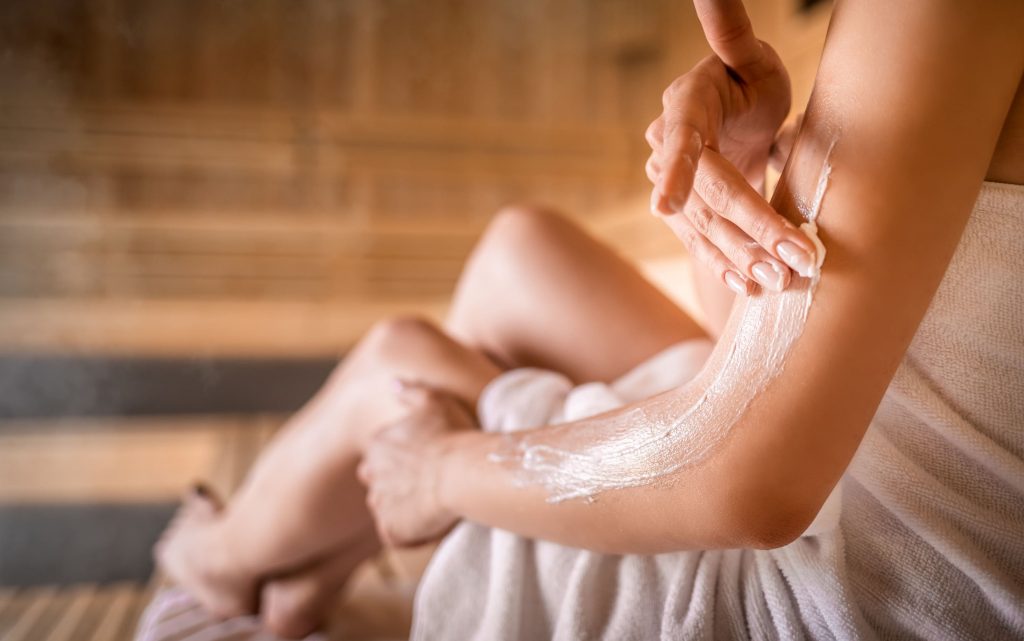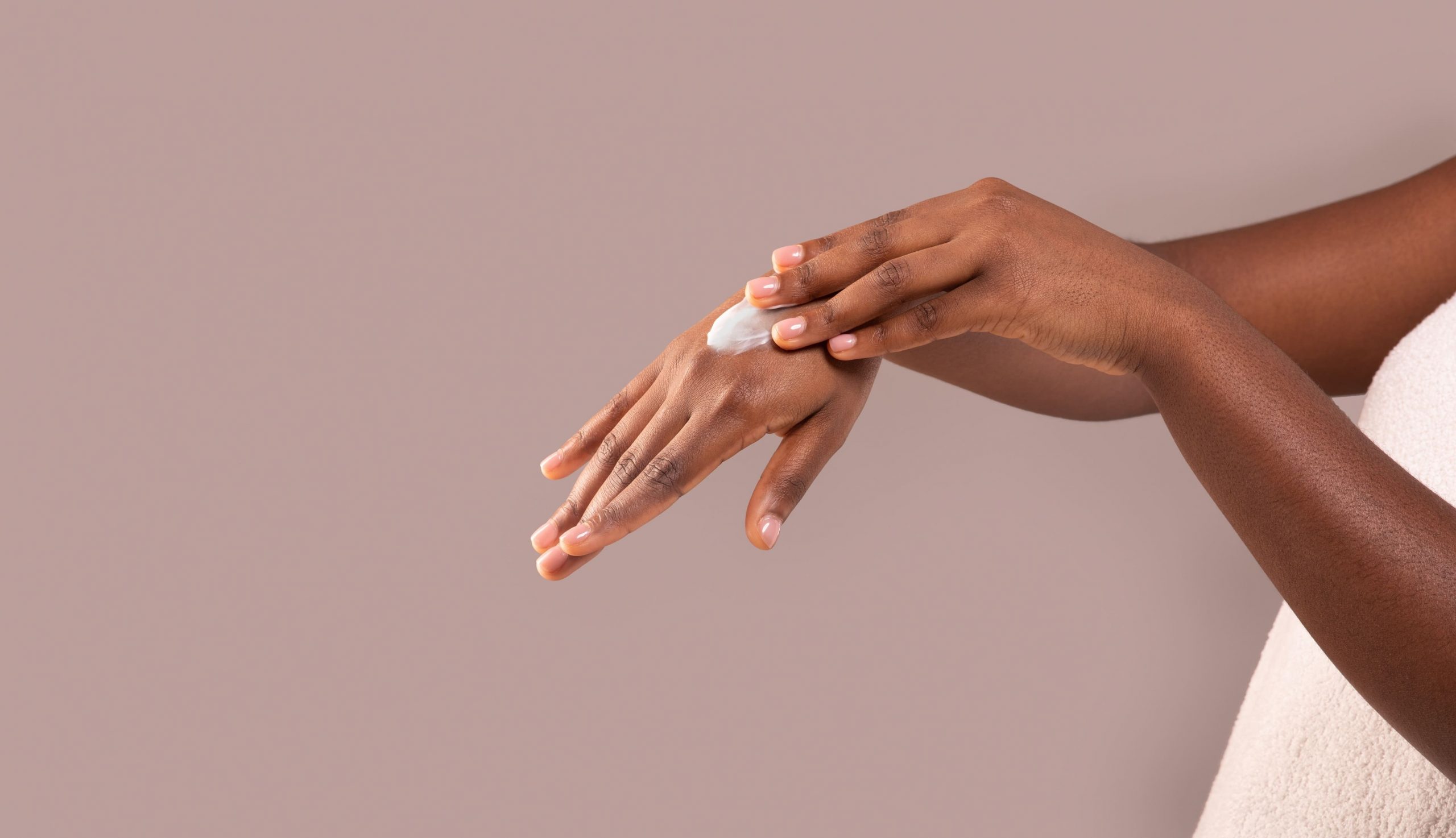Make the commitment to find a rosacea treatment cream that works for your skin. The key is finding a cream that contains all the right ingredients, that has been specifically formulated for your needs.
Rosacea, while not as common as other skin conditions, affects around 10% of the Australian population and unfortunately, has no cure. It can be managed with topical treatments to reduce inflammation, redness, and bumpy skin. While lifestyle changes, in-clinic laser or IPL or light treatments for redness and broken vessels will complement any rosacea treatment cream. The best way to find the right treatment for your skin is by speaking with your dermatologist or an online telehealth provider.

What is rosacea and do you have it?
Rosacea (pronounced: ro-SAY-sha) is a chronic inflammatory disorder that occurs on the facial skin. The most common symptom is redness across the centre of the face (nose, cheeks, chin, and forehead). This redness is ever-present and intensifies from time to time. Acne-like spots, rough skin, and visible blood vessels (called ‘telangiectasia’) can also develop as the rosacea progresses.
People with rosacea tend to flush or blush, especially when nervous or anxious, drinking alcohol, eating spicy food or after exposure to the sun. Cold, dry weather can also make rosacea flare up. Dry, itchy, and sensitive skin that reacts to skincare products are also common symptoms.
It most often affects women over the age of 30 with lighter skin tones, although it can develop at any age, and can occur in deeper skin tones. Rosacea has also been found to run in families. In men, rosacea can present as thickened, red, and lumpy, bulbous skin, particularly on the nose (called ‘rhinophyma’) and is more common in men aged over 50.
Sore, dry, red, bumpy, and sensitive skin can make you feel anxious, embarrassed, and depressed, which we all know does nothing for your self-confidence. If you suspect you may have rosacea, you either visit a dermatologist or get in contact with a telehealth medical skincare provider, like Qr8 MediSkin to have them prescribe a tailored rosacea cream suited to your skin.
What causes rosacea?
The cause of rosacea is not completely understood, however, there is growing evidence that it is linked with systemic inflammation and immune and vascular system dysfunction.
It is widely accepted that sun exposure plays an important role in rosacea flare-ups, and the overall progression of the disorder. This is due to ultraviolet (UV) radiation increasing the free radicals in the skin. These in turn stimulate the immune system and release the chemicals that cause dilation of blood vessels in the skin.
In some cases, a common skin mite (called Demodex folliculorum) may be involved. Even though this mite is often found on our skin, in those with rosacea the numbers of Demodex are significantly increased.
How do you manage rosacea?
With no cure, managing and minimising flair ups is the only way to handle rosacea. What additions or changes to your skincare routine can you make to help you manage rosacea?
Because rosacea negatively impacts the skin barrier, it can cause dry, itchy, sensitive skin that burns and stings when using cosmetic skincare products. Any product that is fragranced or that contains active ingredients like exfoliants, and vitamin C can be particularly irritating.
Customised prescription rosacea creams
Doctors and dermatologists can customise the best rosacea treatment cream for you. You can choose to go in person or use a telehealth medicine provider to consult with a doctor online via a one-to-one video call. They should help you identify any rosacea triggers and explain which of the multiple rosacea treatment options are right for you.
Using clinical guidelines based on the most current and best-available evidence they will design the best rosacea treatment for you – a treatment cream for rosacea with a fully customised blend of active ingredients that can be adjusted to suit your skin’s tolerance, allergies and sensitivity level, available only on prescription.
These prescription rosacea creams will contain powerful active ingredients such as:
Azelaic acid – prescription-strength concentrations will help minimise spots, calm inflammation, kill bacteria, and unclog pores which can lead to the bumps that are often mistaken for acne.
Niacinamide – this works to soothe inflammation and improve the skin barrier function.
Oral antibiotics – in some cases, doctors might prescribe oral antibiotics in tandem with a topical rosacea cream. They should only be used if absolutely necessary to avoid contributing to antibiotic resistance.
Prescription retinoids – these should only be included in your skincare regimen once you have learnt how to manage your rosacea. Even then, only prescription strength retinoids that are well-tolerated by sensitive skin should be used.
A rosacea-friendly skincare routine
Likewise, overloading your skin with products, using grainy exfoliants, or cleansing tools (including overzealous rubbing with a soft face cloth or washer) can cause rosacea flare-ups or encourage redness to persist in the skin. Finding a sunscreen that doesn’t sting is vital, as sunlight plays a large role in triggering rosacea, and making it worse.
What to DO
- Keep your skincare routine simple
- Choose only gentle, fragrance-free products
- Use only your fingers to cleanse the skin
- Keep cleansing to a minimum
- Rinse your skin only using lukewarm water
- Keep the skin barrier healthy with a focus on moisturising
- Always use sunscreen and sun protection (sunglasses, hats, and clothing)
The right combination for your skin
Rosacea can be a tricky skin condition to manage with heightened skin sensitivity and dryness. However, by using sun protection along with a prescription treatment tailored to your skin’s needs, you will be able to reduce the severity of your symptoms while also minimising their progression. Working with a dermatologist or online telehealth provider to discover what your triggers are, what lifestyle and skincare routine changes you can make will only serve to improve your management of rosacea and help you diminish its appearance.


